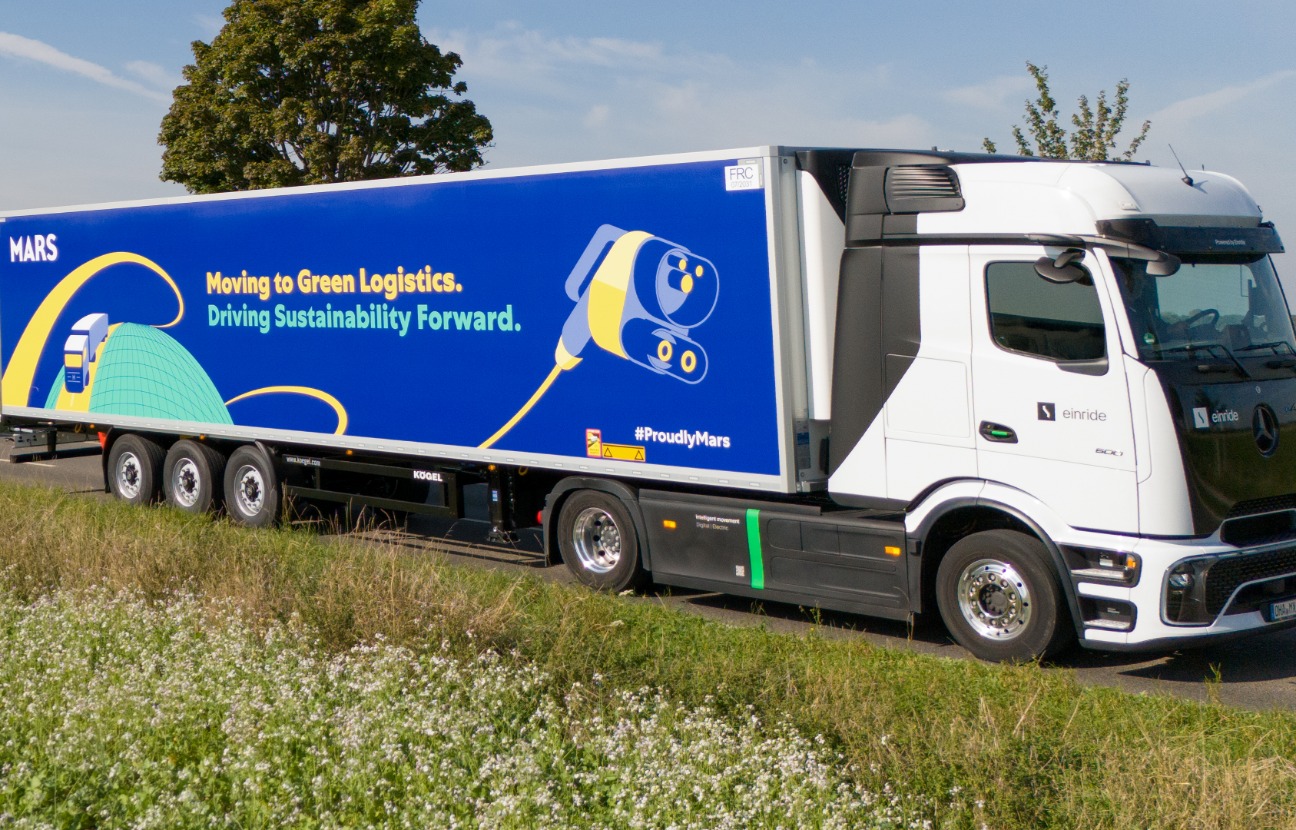Mars partners with Einride to scale up data-driven electric freight across Europe

Mars, the multinational behind brands such as Snickers and Pedigree, has begun adding Mercedes-Benz eActros 600 electric trucks to its European fleet as part of a wider effort to decarbonise its transport operations. The move, which includes six trucks currently operating between Germany and the Netherlands, is part of Mars’ commitment to reach net zero by 2050 and to halve its greenhouse gas emissions by 2030.
“This includes a new target to cut carbon in half by 2030 across our full value chain (Scope 1, 2, 3),” says Bjoern Schlenker, Supply Chain Director DACH at Mars. “One part of that is transforming the type of transport the business relies on and the energy sources used.”
Building a data-led electric fleet
Transport makes up around 12% of Mars’ global emissions, according to the company’s internal analysis. Its aim is to deploy 300 electric vehicles across Europe by 2030, an effort it says could reduce emissions from logistics by about 20,000 tonnes of CO₂ each year, or roughly 10% of its European logistics footprint.
The six new trucks will operate between Mars’ chocolate factory in Viersen (Germany), production site in Veghel (Netherlands), and warehouse in Minden (Germany), where the company installed charging stations last year. Mars estimates the routes will cover 760,000 kilometres annually and save around 1,860 tonnes of CO₂e compared with diesel transport.
But the deployment is also being treated as a learning exercise. Mars is using the roll-out to gather operational data on energy use, charging efficiency and fleet performance — information it says will shape how it expands electrification across the region.
Partnering for scale with Einride
To manage this process, Mars has partnered with Einride, the Swedish technology firm known for its electric and autonomous freight systems. Einride’s platform integrates electric vehicles, charging infrastructure, and digital fleet-management tools that track and optimise vehicle use in real time.
“Our partnership with Einride is an important step in understanding how to effectively scale electric transport across Europe,” Schlenker says. “Einride combines electric vehicles, charging infrastructure, and digital fleet management software—providing a valuable opportunity for Mars to test and learn about large-scale EV integration, operational efficiency, and energy management.”
The collaboration allows Mars to simulate energy demand, test charging infrastructure and assess the economics of different routes — all critical for scaling up beyond a handful of vehicles.
“This initiative builds on our strong collaboration with our logistics partners,” Schlenker adds. “It forms part of our broader strategy to accelerate the decarbonisation of logistics by leveraging data-driven insights, improving fleet performance, and building the foundations for a long-term, sustainable transport network in Europe.”
Einride has previously worked with logistics and retail companies including Maersk and Lidl. For Mars, the company’s data analytics in logistics provide a structured way to analyse how electric transport performs under the demands of a continental supply chain.
Testing limits of zero-emission trucking
While the expansion signals progress, long-haul electrification remains challenging. Range, battery weight and charging infrastructure all constrain how quickly heavy-duty EVs can replace diesel.
“The currently limited range of electric vehicles, combined with the still-scarce charging infrastructure, means that we can’t yet operate an EV 1:1 in the same way we operate a diesel truck,” Schlenker acknowledges. “We’re in the process of learning which routes to choose and how to collaborate most effectively with partners to fully leverage the potential of EVs.”
Mars hopes its early work with Einride will identify which routes and operating models are most feasible for expansion. “The scale effect is only now kicking in,” Schlenker says, noting that manufacturers are beginning to produce electric trucks in higher volumes, bringing down costs.
Incremental change in a high-emission sector
Freight transport remains one of the most stubborn sources of industrial emissions. While many consumer-goods companies have electrified last-mile delivery, the shift to low-carbon long-haul trucking has been slower, largely due to infrastructure gaps and upfront costs.
Mars’ partnership with Einride reflects a broader shift toward data-driven fleet decarbonisation. By monitoring energy use and performance metrics, the company can map out how to deploy charging stations and manage grid loads at scale — turning operational data into a planning tool for future expansion.
The initiative fits within Mars’ wider European decarbonisation programme, which also includes renewable energy at all sites, regenerative agriculture, and efforts to eliminate deforestation from its supply chain.
Part of a wider trend
Mars is not the only consumer-goods giant electrifying its fleet. PepsiCo, working with XPO Logistics, has deployed electric Mercedes eActros trucks in the UK, while CEVA Logistics operates more than 500 low-carbon vehicles across France, Belgium and the Netherlands. Global logistics providers including DHL, UPS and Amazon have all committed to expanding their electric heavy-goods fleets.
What distinguishes Mars, however, is that it is integrating electric transport directly into its core production and distribution network rather than outsourcing it entirely to logistics providers. By combining operational control with Einride’s data platform, the company is using real-time logistics data to understand—and potentially accelerate—the practicalities of scaling zero-emission freight.
“The switch to electric road transport is an important step to develop and implement a more resilient, efficient, and sustainable supply chain,” Schlenker says. “Not just for the immediate future, but for the long-term transformation of logistics.”
Whether that transformation can happen fast enough to meet Mars’ 2030 and 2050 climate goals remains to be seen. But by pairing data with deployment, the company is beginning to answer one of the toughest questions in corporate decarbonisation: how to move goods at scale without moving the needle on emissions.